As part of the lecture series at the SFB – TRR 161 “Quantitative Methods for Visual Computing”, the Institute of Entrepreneurship and Innovation Science (ENI) visited virtually and talked about their ongoing transfer projects, i.e. the Cyber Valley and the Exi+ project which supports students and early stage researchers in starting their own company. Tobias Dürr, innovation manager at Cyber Valley, Marcel Werle, startup coach, Philipp Häßler, technology scout, and Dr. Ferran Giones Valls, deputy institute director at ENI, held the talk.
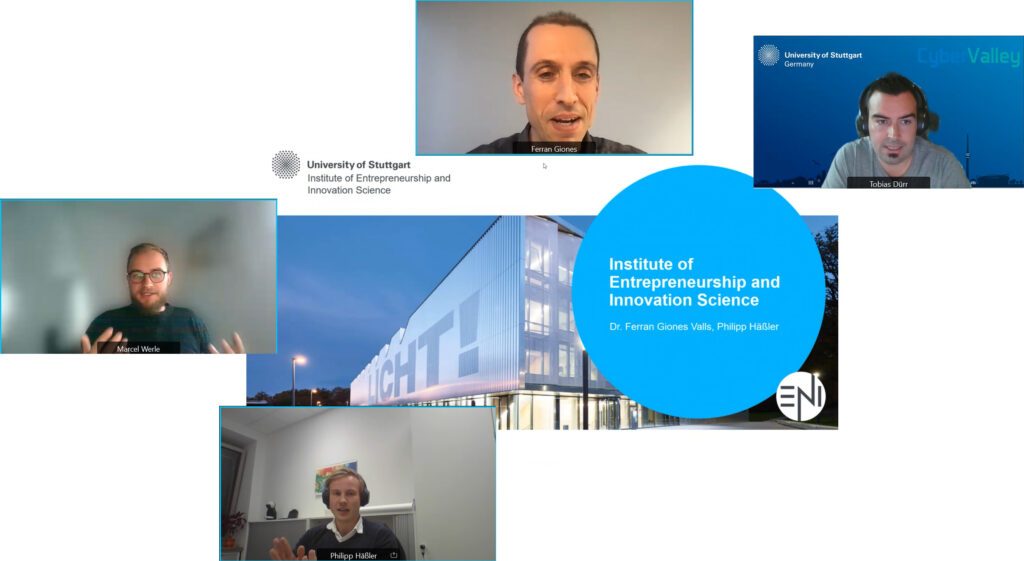
The intention was to give early stage researchers an overview of interesting transfer projects that also interface with their research and give them the necessary knowledge of the first steps on starting a company or connecting with the network.
Below, the talked about points are listed in more detail in an interview style format.
The Institute of Entrepreneurship and Innovation Science
What is the institute all about and what does it do?
The Institute of Entrepreneurship and Innovation Science was established in January 2020 by Prof. Alexander Brem on the back of a movement towards fostering entrepreneurship more closely in teaching and transfer by the University of Stuttgart. The Chair of Entrepreneurship in Technology and Digitization is endowed by the Daimler-Fonds im Stifterverband. Since then the institute has grown to 15+ people working, teaching and researching on all things surrounding transfer. The institute itself is located in the Arena2036 at the Vaihingen Campus and is thus well embedded into exciting networks, e.g. StartupAutobahn and the activities of the Arena2036 itself. On top of that, the institute belongs to the Cyber Valley Cluster and Tobias Dürr is situated at ENI from where he steers the University Stuttgart innovation activities of Cyber Valley. In May 2020, the EXI+ project was launched, with the startup coaches belonging to ENI and supporting students and researchers in their very own projects. Moreover, the institute is highly involved in the regional startup network, collaborating with Hochschule der Medien (HdM) and Gründermotor.

What research focus does the institute have?
Research wise the institute focuses on four different key areas which are:
- Organizational Creativity and Open Innovation
- Science Commercialization & Technology Transfer
- Frugal Engineering & Technological Innovation
- Technology Entrepreneurship & Industry Emergence
Within these fields, it is especially important for the institute to have a constant interplay of teaching – transfer – research. Research at the institute should be applicable in both teaching and transfer.
Within the field of Organizational Creativity and Open Innovation, we study how individuals and organizations can increase their creativity and ideation capacity by using workshops, techniques, and tools in different types of innovation spaces. The Science Commercialization & Technology Transfer field deals with supporting transfer of scientific and technological advances from the lab to the market from both the perspective of the scientist and the innovation ecosystem. The institute is also interested in Frugal Engineering and Technological Innovation where it focuses on the roots of constraint-based innovation approaches to explore how they can be used in the next generation of technology innovation using a frugal engineering approach. Finally, of course Technology Entrepreneurship and Industry Emergence is a focus, where we explore how entrepreneurs are turning emerging technologies into new business opportunities and helping to create new ecosystems.
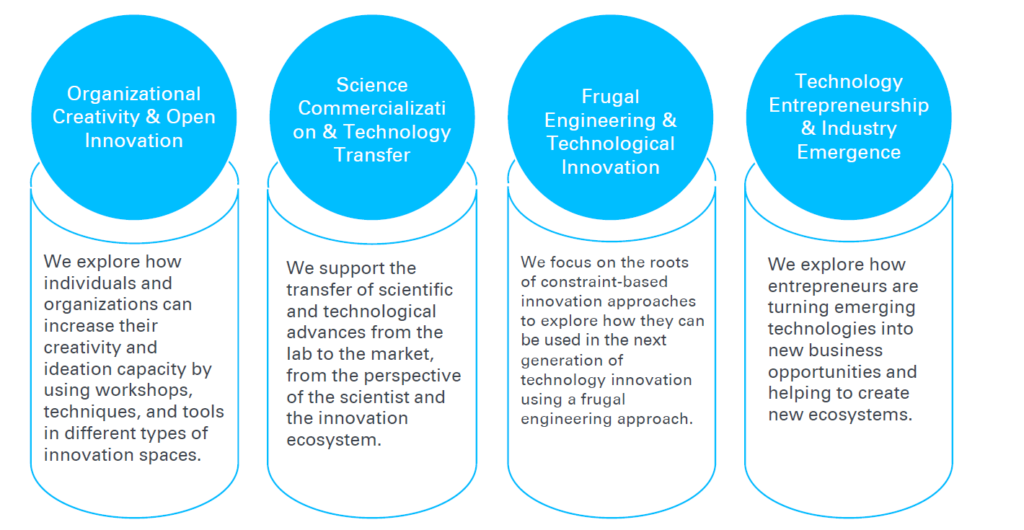
Are you open for collaboration?
ENI is always happy to collaborate with other institutes at the University of Stuttgart or external partners. It is particularly interesting for us to analyze how new technologies move into the market. Thus, we are excited to learn about your technologies! At the same time, we hope to also give back and give insights into how your technology could find applications and move into the market. Particularly, the interplay of different actors and how they build up a market and engage with all relevant players is an interesting aspect for us. As universities and institutes are important parts of the local and regional innovation systems, diving into this is very appealing to us!
If you are interested in what we do and want to collaborate on research or even in transfer, do not hesitate to reach out to Ferran Giones, ferran.giones@eni.uni-stuttgart.de
Cyber Valley
What is the Cyber Valley?
Cyber Valley is Europe’s largest research cooperation in the field of artificial intelligence (AI) with partners from politics, science, business and society. Cyber Valley strengthens research and education in the fields of machine learning, computer vision and robotics as well as the exchange between these scientific disciplines. By promoting the exchange between science and industry, and by fostering start-ups, the technology transfer in this important research field is strengthened. Cyber Valley is located in the Stuttgart-Tübingen region and is funded by the German Federal State of Baden-Württemberg.
Which institutions are involved with Cyber Valley?
At the forefront stands the partnership between the University of Stuttgart, the University of Tübingen and the Max-Planck Institute for Intelligent Systems and the Fraunhofer. Next to that Cyber Valley is supported by several endowments such as the Carl-Zeiss Stiftung or the Vector Stiftung. It also collaborates closely with its firm partners which include a range of leading automotive firms, e.g. BMW, Daimler and Porsche but also automotive suppliers and Amazon. Via the Start-up network and the Investor network Cyber Valley commits to several other partnerships to build the regional ecosystem.
What are Cyber Valley’s core activities?
At its core, Cyber Valley aims at fostering groundbreaking basic research on Artificial Intelligence by enabling to discuss these topics in an open society in a critical and objective manner. Further, it is the designated goal to support young scientists to leading researchers in their field. For this purpose, ten new research groups were established within the cluster. Additionally, one new graduate school at the Max-Planck Institute was established. It’s function is to educate over 100 PhD candidates.
On the other hand, Cyber Valley is supporting the startup culture in academia to help diffuse scientific research results into applications. Cyber Valley hopes to establish the ideal environment for young startups to develop. Also, joint projects with industrial partners are planned. This interplay of more application-oriented industry research and the focus on basic science from universities should foster new spin-offs.
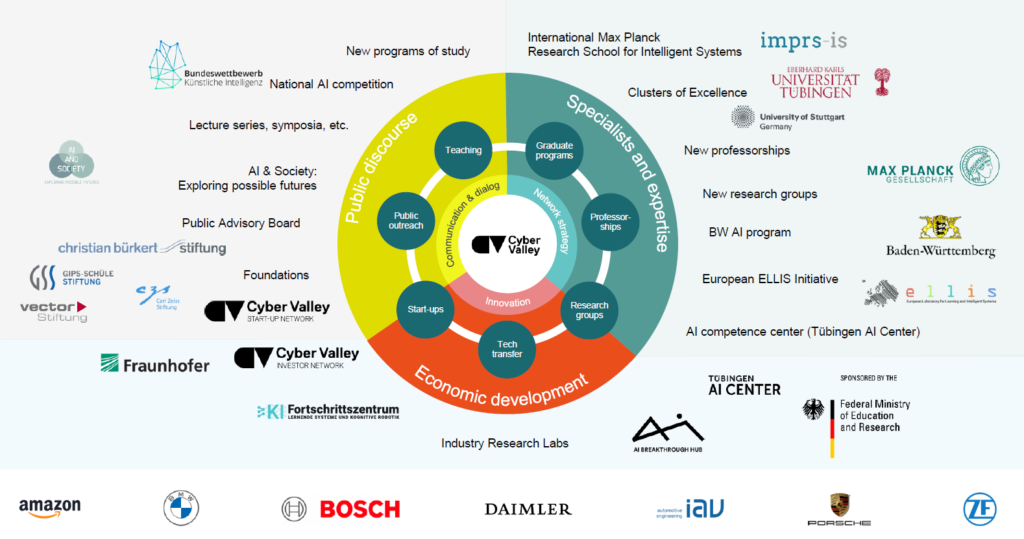
With the Investor Network and the Startup Network, Cyber Valley also wants to establish a local ecosystem connecting startups with venture capital and vice versa, accelerating their growth.
I want to become involved, whom can I contact?
Tobias Dürr is always looking for new people interested in startups, AI research or collaboration and is thus very happy to be contacted. tobias.duerr@cybervalley.com
Entrepreneurship and startup coaching at the University of Stuttgart
How does the coaching process look like?
Usually, the startup coaching process starts with an initial identification via the technology scout to discuss your research results and gauge your interests. However, you are free to contact us by yourself at any time on startupcoaching@eni.uni-stuttgart.de and we will contact you for a first meeting.
Following, we will set up a first meeting and discuss your idea in general including such topics as stage of development, stage of idea, possible pathways and how much you have actually thought about your business idea. We have recently set up a new program, which covers aspects such as defining your value proposition, market opportunity identification, framing of business model, intellectual property rights and financial planning. These workshops are held together with other potential startups to also help you connect to like-minded students and researchers. These workshops run weekly. After that, we will kick off with personal 1-on-1 coaching when we move into the proposal writing period.
During that time, we will also support you through teambuilding and matching opportunities, help you identify your intellectual property and how to protect it and finally integrate you into our network.
We work closely together with all relevant players at the University of Stuttgart, i.e. the central administration department for technology transfer and the Technologie Transfer Initiative (TTI).
A rough recommendation is to allocate around 6 months for coaching and proposal writing as this is just the time a good and initially validated business model needs. However, we adapt to your schedule and speed!
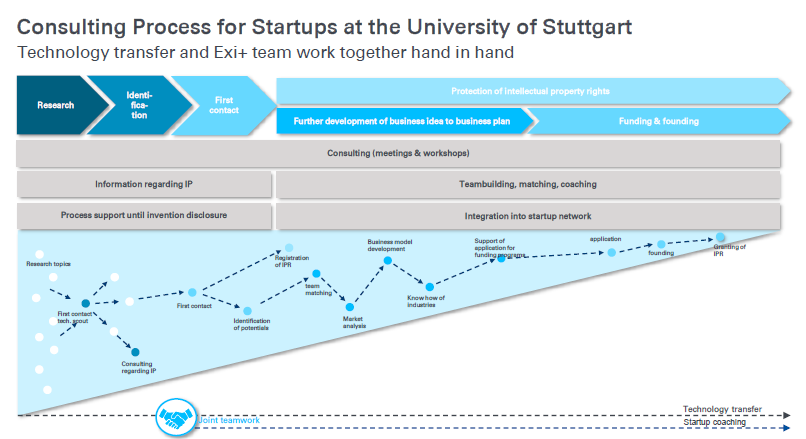
Which grants are available?
We at the Institute of Entrepreneurship mainly advise on three different grants. First, EXIST – Business Startup Grant is a grant that targets students, researchers and alumni and supports the implementation of an innovative idea. It covers three founding team members with a monthly stipend and additional money to cover expenses for coaching or patent applications. It runs 1 year and we advise to use this grant when you can move into the market within that timeframe. A proposal can be handed in any time during the year.
Second, the EXIST – Transfer of Research grant targets innovative projects that still need at least 1 year of development to validate the idea. It aims at supporting the preparation and implementation of very risky and lengthy technology development. It consist of two phases, which both run 18 months and covers four people under the standard TVL-13 salaries. The deadline for submission is end of January or end of July.
Which elements are important for my grant proposal?
The proposal should cover a short executive summary, the business idea, the team, the underlying innovation of the business idea (your research), market and competition, business planning and the business organization. One important thing to note is that it is very important to make it believable that the team can deliver on what they are writing into the proposal. That means that the skillset of the team should ideally supplement each other. In addition, market ideas should be validated by attaching a Letter-of-Intent (LoI) with your application to demonstrate that there is interest for your product or service in this specific target market. Same goes for partners. If you require a partner for the delivery of your product, a LoI is absolutely necessary. Where possible we support you with connections to other institutes or firms that might be good supporters.
Why is IP important for a startup?
Intellectual property often is neglected by young startups because they fear the bureaucracy surrounding IP. However, it is often times the only way to protect your idea against larger competitors. Additionally, you deter others from blatantly copying your idea and improve your negotiation position with prospective partners and investment firms. If you have any questions about IP, please contact Philipp any time philipp.haessler@verwaltung.uni-stuttgart.de.
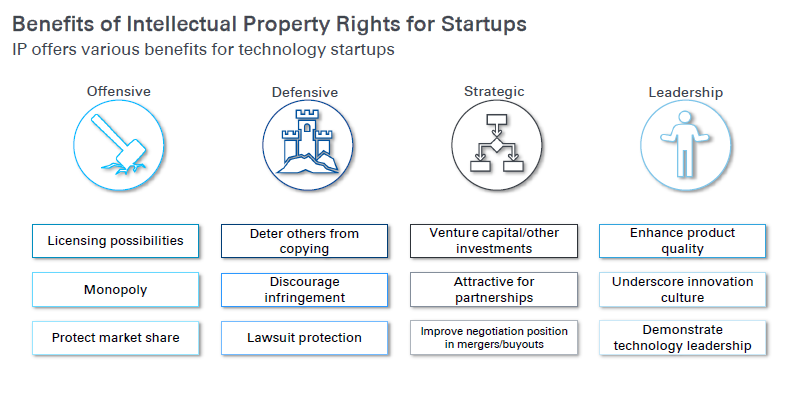
Where can I learn more about Entrepreneurship? Are there any presentations?
We regularly conduct workshops or hold presentations together with the larger institutes and research clusters. If you send us a note, we will make sure to invite you. Beyond that, the University of Stuttgart regularly host the Speaker Series. Information will be hosted on the University homepage. Alternatively, you can always check the institute event page. We regularly post updates about upcoming events. Please also sign up for our entrepreneurship newsletter if you are interested in this topic!
Whom can I contact in case I have a startup idea?
You can contact all of us individually and we will sort it out, however, we also have a collective mail: startupcoaching@eni.uni-stuttgart.de where you will definitely reach the right persons.
Do I need to bring anything?
No, just motivation to work on your dream!
